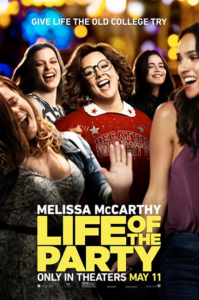Funny McCarthy is surrounded by nothing of substance “Life of the Party.”

 Away from the big screen, Melissa McCarthy is the proud mother of two, but from watching her in “Life of the Party,” you wouldn’t know it. Aside from a few scant moments of chuckle-inducing nonsense, this film is incompetently made and terribly insincere.
Away from the big screen, Melissa McCarthy is the proud mother of two, but from watching her in “Life of the Party,” you wouldn’t know it. Aside from a few scant moments of chuckle-inducing nonsense, this film is incompetently made and terribly insincere.
After dropping Maddie (Molly Gordon) off for her senior year at Decatur University, right then and there in the driveway of Maddie’s sorority house, Dan (Matt Walsh) asks his longtime wife Deanna (McCarthy) for a divorce. This shocking news understandably levels Deanna, whose properly ordered life as a wife and mother is turned inside out.
Initially, she’s lost, and Deanna seeks sage advice from her mother (played by the great Jackie Weaver) and father (a typically funny Stephen Root). Mom repeatedly offers her a sandwich, and dad gets out his gun and recklessly waives it around. Note here: the amazing Jackie Weaver once played Janine “Smurf” Cody in 2010’s “Animal Kingdom.” She’s quite capable of playing a gun toting angry mother. Maybe, just maybe, giving Root the gun was a bit wrong-headed? Then again, this is a film that seeks to reinforce and trade on archaic stereotypes instead of intelligently exploring modern relationships between men and women and parents and children.
Anyway, it is in this poorly shot and conceived scene where we learn that Dan, naturally, kept Deanna from finishing her college degree at Decatur. Well, maybe leaving the university was more related to Deanna’s pregnancy with only child Maddie, together with her undying commitment to becoming a great wife. But, no matter, the blame is placed solely on Dan’s narrow shoulders.
Now a single, empty-nester, Deanna decides to go back to Decatur and finish the degree that once eluded her. Thus, the gender flip “Old School” pieces are in place. Unfortunately, “Life of the Party” wants to be the kinder, gentler version of that comedy hit, while channelling elements of Rodney Dangerfield’s 1986 film “Back to School.” Unfortunately, “Life of the Party” fails to make the grade scored by either of those comedies.
Lacking structure and credible character development, the movie is only elevated above direct-to-Netflix, shoddy, romantic comedy status by McCarthy’s improvisational pantomime. Even though I’ve not read the “Life of the Party” screenplay, co-written by McCarthy with husband/director Ben Falcone, I can’t imagine that its funniest gags are completely scripted. And when McCarthy is allowed to just be her, often hilarious, free-wheeling self, laughs do come, but the surrounding material is so bad, and I mean awful, the entire affair is heavily weighed down.
Consider the narrative here: Deanna has been happily married for around 20 years. Her husband has been involved in an affair that he openly admits. Deanna has not worked and has no ready job skills. The two have a home, albeit titled in the husband’s name (not atypical for one partner to have title to the property).
But if you believe the story told in the film, Deanna is shown as no better off than if she were living in Afghanistan under the Taliban.
However, in the United States, there is no way, NO WAY, that Deanna would be treated this unfairly in a divorce. Matt would not be permitted to sell the house out from under her. He would be required by the court to pay her attorney’s fees, pay alimony, pay, at least, half the equity from the sale of the house, enter into something called a QDRO (as to retirement funds), and likely pay for job training and education for Deanna.
In “Life of the Party,” Deanna is depicted as having no power, rights, or even resources. She never meets with an attorney or even questions Dan’s tyrannical actions. It’s completely ridiculous. This fantasy-land, frustrating, cartoon world-building undercuts everything funny in the film. Arguably, “Old School” is far more credible.
So, establishing that “Life of the Party” is not concerned with the reality of modern divorce, the relationship of mothers and daughters, or the value of a good college education, what the heck is it about? The answer is that it’s merely a launching pad for McCarthy’s humor. But the PG-13 script is way too restrained and limiting, and stuck in low gear.
What a wasted opportunity for director Falcone, who was given three fiery sirens to work with. This points out the saddest thing about “Life of the Party,” it fails to give the talented women in the film led by McCarthy, but also featuring Maya Rudolph, and, of course, Weaver, something real to comedically attack. Slapdashery laughs are weightless if there is nothing of substance surrounding them.
